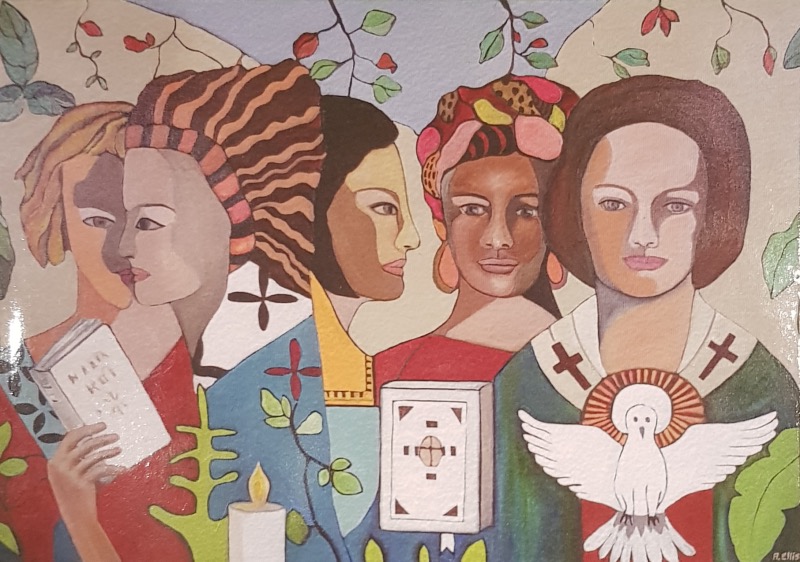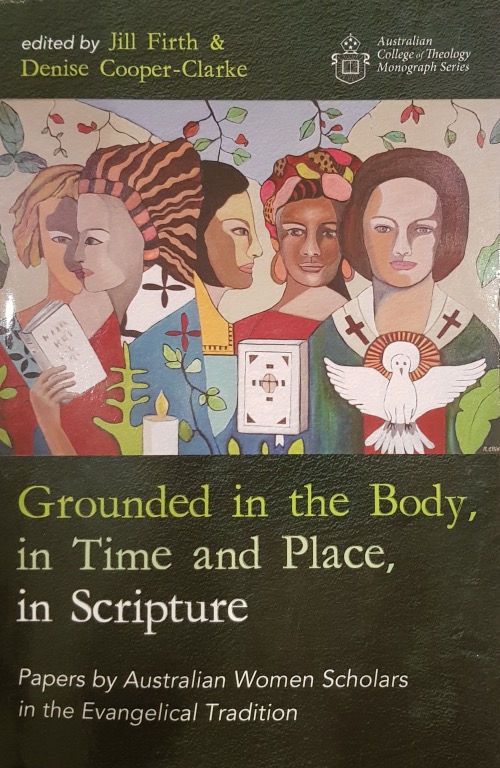
KARA MARTIN, who has contributed a chapter to a new book, ‘Grounded in the Body, in Time and Place, in Scripture: Papers by Australian Women Scholars in the Evangelical Tradition’, writing about why she found it such an exciting project to be a part of…
Sydney, Australia
I remember vividly the time I was sitting in a faculty meeting at a theological college, 80 per cent of whom were men, and we were talking about the difficulties of making the theological college more attractive to women.
I grabbed brochures of our next set of events and showed that all the photos on the covers, and even of the audience, were all male. There was only one woman speaker in seven talks and conferences, and she was running a workshop.

“The reality is, that the vast majority of Christian academic texts are written by men; white men to be accurate…There has been an effort in recent years to remedy that, but it was the natural outworking of a particular reading of Scripture that saw women as lacking the gifts, skills, or authority to comment on Scripture. As views changed, there remained systemic challenges including policies that privileged the voices of men.”
“The problem,” someone told me, “Is that there are simply not enough suitably qualified or talented women around.”
“Are you sure?” I asked, “Or do we not know where to look? And if it is the case, then what are we doing to raise up suitable women scholars?”
Fast forward a few years, and my friend Dr Jill Firth, Old Testament lecturer at Ridley College, invited me to contribute to a book of woman scholars.
Like most of the key events in my life, I did not realise that this was going to be a special blessing. I did feel privileged, but there was also a part of me which saw it as a chore. I describe myself as an accidental academic, and I knew that writing a chapter for this book would be hard work.
I mainly said “Yes” because I was friends with Jill, and I had been encouraged by her tireless efforts to promote women into and through theological education. She had set up a preaching network (with NT lecturer Anthea McCall) and a writing workshop (now run by Diane Hockridge), and the annual Evangelical Women in Academia Conference to both showcase and network excellent women theological academics.
Thus, I grudgingly started researching and writing. As the project developed, however, I began to realise how significant this volume is, and how strategic the editors had been.
The reality is, that the vast majority of Christian academic texts are written by men; white men to be accurate. While not wanting to ignore the collective wisdom of these significant resources, there have been some perspectives that have not been considered.
There has been an effort in recent years to remedy that, but it was the natural outworking of a particular reading of Scripture that saw women as lacking the gifts, skills, or authority to comment on Scripture. As views changed, there remained systemic challenges including policies that privileged the voices of men.
That we would have to wait until 2021 to have a volume of exclusively women’s voices on a variety of topics of interest for theological education seems surreal, yet here it is. Although, this book represents so much more than that!
Grounded in the Body, in Time and Place, in Scripture, also represents a diversity of cultures and backgrounds. There are some lovely contributions from Indigenous and Asian perspectives, including a new psalm, written in Kriol. Further, it represents a variety of disciplines: Biblical studies, theology, Christian history and practical theology.
While many academic volumes are a mish-mash of chapters of varying quality and accessibility, this book has been carefully edited so that there is a consistent quality, while maintaining the distinctiveness of different voices. Every writer, from beginning scholars to accomplished authors, was coached to improve their writing and research.
I have now contributed to five academic volumes, and my guilty admission is that I rarely read them. Usually, the main task of an academic is to appear in edited volumes, not read them! However, this book is truly an exception.
Let me whet your appetite with some snippets from the chapters. Common Grace CEO Brooke Prentis uses Job 12:7–10 to remind us that animals, birds, the Earth, fish, oceans and the sky are connected, and can teach us about God and his ways. She draws on her Aboriginal heritage to explain connections with Biblical wisdom on this topic. In the next chapter, Jude Long uses her experience as principal of an Aboriginal college to reveal what she learnt from her students about grounded learning, and connecting with God through the land, kinship and suffering.
Moyra Dale, who has two PhDs, writes a fabulous chapter examining ideas of purity. She points out that Jesus overcomes all the things that make us impure -defilement, disfigurement, disease, depravity and death – through His living, dying and rising.
Melinda Cousins, a church pastor from South Australia, reveals how the psalms refer to seven ‘senses’ through seven body parts, and the way that church can assist its congregation to engage with all of our seven senses.
“For almost 150 years there have been women obtaining theological qualifications, teaching in colleges and writing books. Perhaps it was a case that until now we didn’t know where to look.”
Tanya Riches, who leads and teaches at Hillsong College, looks at her tradition of Pentecostalism and its image of the beautiful body, contrasting that with her work at a Sydney University research centre amongst those who are disabled, and promoting the witness that disability provides.
The text concludes with an extraordinary and historically significant list of the first women scholars, lecturers and principals in Australian theology, beginning in 1883.
Jill Firth, who compiled the list, concludes that there is a “great cloud of witnesses” of women who studied theology, giving their lives in daily service to church, the community, the needy and in foreign lands. For almost 150 years there have been women obtaining theological qualifications, teaching in colleges and writing books. Perhaps it was a case that until now we didn’t know where to look.
Grounded in the Body, in Time and Place, in Scripture: Papers by Australian Women Scholars in the Evangelical Tradition, is edited by Jill Firth and Denise Cooper–Clarke.
Kara Martin has a chapter in this book, titled ‘Grounded in Work’, and is the author of ‘Workship: How to Use your Work to Worship God’, and ‘Workship 2: How to Flourish at Work’.





